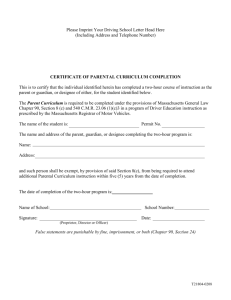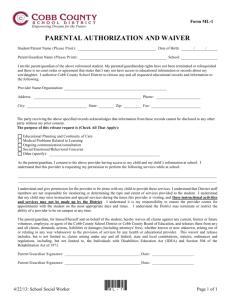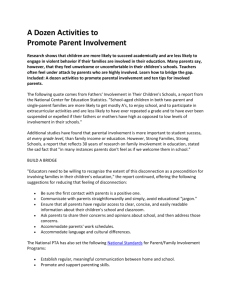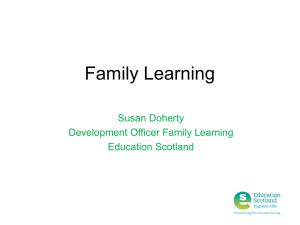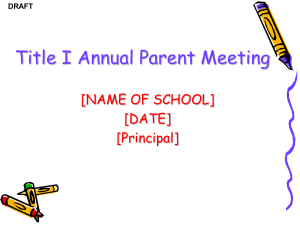Children - Determining Parental Responsibility for a Child
advertisement
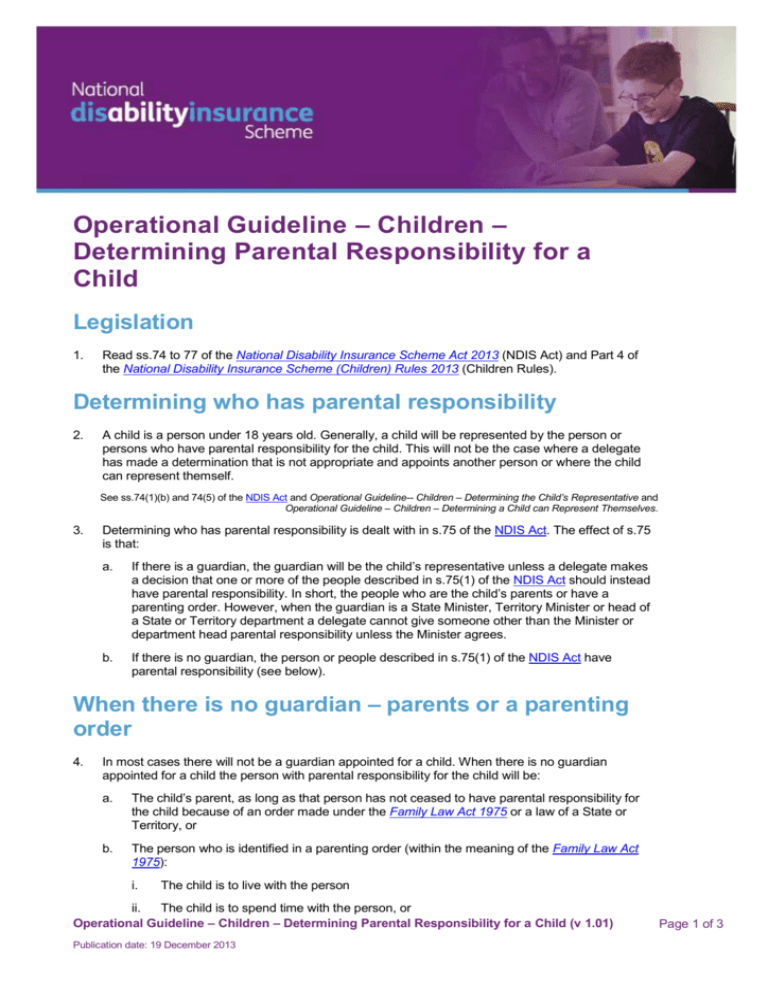
Operational Guideline – Children – Determining Parental Responsibility for a Child Legislation 1. Read ss.74 to 77 of the National Disability Insurance Scheme Act 2013 (NDIS Act) and Part 4 of the National Disability Insurance Scheme (Children) Rules 2013 (Children Rules). Determining who has parental responsibility 2. A child is a person under 18 years old. Generally, a child will be represented by the person or persons who have parental responsibility for the child. This will not be the case where a delegate has made a determination that is not appropriate and appoints another person or where the child can represent themself. See ss.74(1)(b) and 74(5) of the NDIS Act and Operational Guideline-- Children – Determining the Child’s Representative and Operational Guideline – Children – Determining a Child can Represent Themselves. 3. Determining who has parental responsibility is dealt with in s.75 of the NDIS Act. The effect of s.75 is that: a. If there is a guardian, the guardian will be the child’s representative unless a delegate makes a decision that one or more of the people described in s.75(1) of the NDIS Act should instead have parental responsibility. In short, the people who are the child’s parents or have a parenting order. However, when the guardian is a State Minister, Territory Minister or head of a State or Territory department a delegate cannot give someone other than the Minister or department head parental responsibility unless the Minister agrees. b. If there is no guardian, the person or people described in s.75(1) of the NDIS Act have parental responsibility (see below). When there is no guardian – parents or a parenting order 4. In most cases there will not be a guardian appointed for a child. When there is no guardian appointed for a child the person with parental responsibility for the child will be: a. The child’s parent, as long as that person has not ceased to have parental responsibility for the child because of an order made under the Family Law Act 1975 or a law of a State or Territory, or b. The person who is identified in a parenting order (within the meaning of the Family Law Act 1975): i. The child is to live with the person ii. The child is to spend time with the person, or Operational Guideline – Children – Determining Parental Responsibility for a Child (v 1.01) Publication date: 19 December 2013 Page 1 of 3 iii. The person is responsible for the child’s long-term or day-to-day care, welfare and development. See s.75(1) of the NDIS Act. Special rules if there is a guardian 5. There are different rules for determining who has parental responsibility when a child has a guardian. If a person has guardianship of the child under a Commonwealth, state or territory law then that guardian has parental responsibility unless the delegate makes a decision that one or more of the people described above (parents or parenting order) should instead have parental responsibility. State or territory minister remains the guardian unless they agree otherwise 6. When the guardian is a state minister, territory minister or the head of a state or territory department a delegate cannot give someone other than the minister or department head parental responsibility unless the minister or department head agrees in writing. This means that a delegate cannot make a decision to give another person parental responsibility before receiving the minister or department head’s agreement in writing. See s.75(3A) of the NDIS Act. The decision to give a person other than the guardian parental responsibility 7. If a person has guardianship of the child under a Commonwealth, state or territory law then that guardian has parental responsibility unless a delegate makes a decision otherwise. The delegate can only give parental responsibility to a person who meets the definition above as having parental responsibility because they are parents or have a parenting order. 8. When deciding whether to make a determination that one or more people who are parents or have a parenting order should have parental responsibility instead of the guardian, the delegate must: a. Consult, in writing, with the child’s guardian, and b. Have regard to the following: i. The principle that, particularly when the child’s guardian is a minister of a state or territory, the child’s guardian should be the child’s representative unless the delegate is satisfied that this is not appropriate ii. Whether the child’s guardian recommends that another person should be the child’s representative iii. The extent to which the child’s guardian is willing and able to perform the functions of child’s representative set out in s.76 of the NDIS Act and Part 6 of the Children Rules, and iv. Whether the person that the delegate is considering giving parental responsibility is more willing and able to perform the functions of child’s representative set out in s.76 of the NDIS Act and Part 6 of the Children Rules. See r.4.6 of the Children Rules. Operational Guideline – Children – Determining Parental Responsibility for a Child (v 1.01) Publication date: 19 December 2013 Page 2 of 3 Where more than one person has parental responsibility 9. Where there is not a guardian but there is more than one person who meets the definition above as having parental responsibility because they are parents or have a parenting order, all those people have parental responsibility unless the delegate decides otherwise. The delegate has a discretion to choose to either: a. Leave all the people that have parental responsibility in place and they all share parental responsibility, or b. Make a determination that one or more persons are to have parental responsibility for the child for the purposes of the NDIS Act. See s.75(3) of the NDIS Act and r.4.8 of the Children Rules. 10. When deciding whether to make a determination that one or more persons are to have parental responsibility, the delegate must have regard to the following: a. The preference (if any) of the child b. The views of any person who has parental responsibility for the child c. Whether one or more of those persons are best placed to carry out the duties to children set out in s.76 of the NDIS Act and Part 6 of the Children Rules, taking into account: i. Existing arrangements that are in place between those persons and the child ii. Which persons have responsibility for day-to-day parenting decisions, and iii. Which persons can act in conjunction with other representatives and supporters of the child in the best interests of the child d. Whether one or more of those persons are willing and able to work together in the best interests of the child e. The desirability of preserving family relationships and informal support networks of the child, and f. For any of the persons: i. Where the delegate has asked any of the persons to answer any questions or provide any information in relation to making a determination that applies to that person (including requesting a person to consent to the release of information concerning their criminal history or suitability to work with children): A. Any answers or information that have been provided by the person, and B. Any refusal by the person to provide answers or information, ii. Any relevant conviction for an offence under Commonwealth, state or territory law, and iii. Any relevant information relating to the suitability of the person to work with children. See r.4.9 of the Children Rules. Operational Guideline – Children – Determining Parental Responsibility for a Child (v 1.01) Publication date: 19 December 2013 Page 3 of 3

